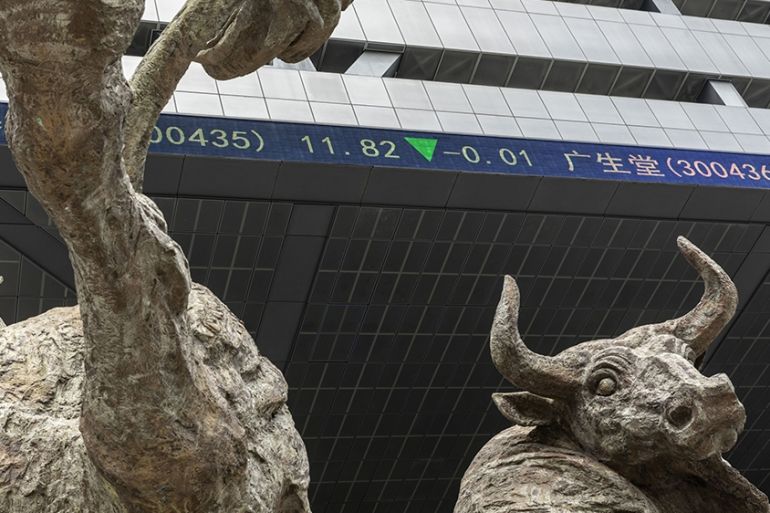China urges more investor protections amid record bond defaults
China’s onshore bond defaults have exceeded 130 billion yuan so far this year, says Bloomberg data.

China’s financial regulators are calling for more transparent and fair handling of defaults to restore investor confidence in the world’s second-largest bond market, after repayment failures hit a record high this year.
Senior officials from the central bank, the securities regulatory body, the supreme court and other departments discussed court-mediated dispute resolution concerning bond defaults at a symposium in Beijing on Tuesday, according to a statement posted on the website of People’s Bank of China.
Keep reading
list of 4 itemsChina’s yuan sinks to record low against the dollar
Zimbabwe unfreezes bank lending only days after policy change
After Biden-Xi summit, what next for US-China trade war?
Improving the mechanism of handling bond defaults will be essential to prevent and resolve financial risks, and it must be done in a way that is market based and respects the rule of law, the statement cited Liu Guoqiang, a deputy central bank governor, as saying at the meeting. Zou Lan, a senior official of the People’s Bank of China in charge of financial markets, urged more efficient tackling of repayment failures at the same gathering, the state-run Financial News reported Wednesday.
China’s onshore bond defaults have exceeded 130 billion yuan so far this year, surpassing the previous annual high of 122 billion yuan reached in 2018, according to data compiled by Bloomberg. The wave of missed repayments has raised concerns over refinancing risks and the government’s ability to keep financial markets stable amid slowing economic growth.
All bondholders must be treated on an equal footing in the process of settling default disputes, Liu was also cited as saying in the statement.
Under-the-table repayment arrangements are not uncommon in China after companies failed to honor their debt obligation. Opaque practices include prioritizing compensation for retail investors over institutional creditors or repayment of offshore debt over onshore notes. Another trick concerning analysts is when a debtor misses payment, it tends to seek to negotiate payment extension with creditors via private discussion in lieu of resolving it through the clearing house.
China has started to develop a market-based system for bond extension and trading of defaulted debts, as part of efforts to build a “multi-layer mechanism” to diversify approaches of handling repayment failures, Liu said. The country will increase the collaboration between different bond market regulators, with the next focus on improving bond market information disclosure rules, he added.
At the symposium on Tuesday, Zhou Qiang, president of Supreme People’s Court, promised to strengthen the protection of investor rights, such as holding bond issuers more accountable for information disclosure.
Yi Huiman, chairman of the China Securities Regulatory Commission, said the watchdog will step up the oversight of bond issuers and intermediary agencies and increase penalties on violators, according to the statement.
— With assistance by Tongjian Dong